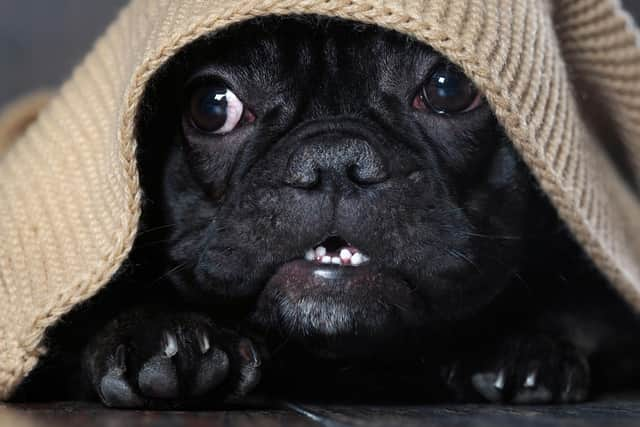Dogs and New Year Fireworks: Here are 5 expert tips on keeping your adorable pup calm during Hogmanay fireworks
and live on Freeview channel 276
If your dog has reacted badly to fireworks previously, or you have a new puppy you are concerned about, then there are a few things you can do to mitigate the issue.
Dog-friendly holiday letting specialist, Canine Cottages, has teamed up with animal behaviourist Kirsten Dillon, veterinarian Jenny McKay, and dog behaviour consultant Andrew Hale, to come up with the best tips on how to help your dog cope with loud noises.
Advertisement
Hide AdAdvertisement
Hide AdHere’s the problems they have identified and the best way to deal with them.
Why are dogs frightened of fireworks?
Our dog’s fear of fireworks come from a flight or fight response – the loud noise is unlike any natural sounds and is so loud that a dog’s initial reaction is usually to run.
Fear can come in other behaviour, too. Dillon explains that “even yawning, excess shedding, panting and licking their mouths are signs of fear.”
Your dog might also show sign of stress, and not just fear – this can include tucking their tail between their legs, pacing or shaking, refusing food and low energy.


Advertisement
Hide AdAdvertisement
Hide AdThough your dog isn’t afraid of you, they can show stress and fear by shying away from any contact you offer.
It’s important to respect this boundary and try to be as gentle and kind to your pooch as you can.
Take your pet for a walk in the daytime
To help settle your pet and take them away from the bulk of the noise as much as possible, make sure to walk them in the daytime before any of the fireworks or bonfires begin.
Advertisement
Hide AdAdvertisement
Hide AdLetting your dog run off some steam in the day might also help keeping them a bit calmer in the evening, as leaving them inside all day can cause them further distress.
Calm your dog by shutting out the noise
Playing calming music and shutting your windows, drawing the curtains, and staying in one room with your dog might help them stay calm during the firework displays.
As Hale explains: “Drawing the blinds will prevent dogs from seeing the fireworks displays, which helps them relax more.”
Making sure your dog is as comfortable as possible is key to keeping them calm, and as Dillon says: “If your dog chooses to hide under your bed, it’s important to give them access to this.”
Advertisement
Hide AdAdvertisement
Hide AdThe more you can do to keep your dog calm and comfortable, the better.
Keep calm for your pooch
It is imperative that you remain calm whilst the fireworks are going on, as showing negative and stressed behaviour can make your pooch even more anxious.
McKay mentions the acronym ‘CATS’, meaning: Close curtains and doors, add music, allow your pooch some delicious treats, and let them find a safe space.
By keeping calm while letting your dog find comfort, you are showing them there is nothing to be afraid of.
Advertisement
Hide AdAdvertisement
Hide AdThere are medicines you can offer your pooch to keep them calm, but make sure to never self-medicate – always consult a vet first.
Familiarise your dog with the sound
Surprisingly, familiarising your dog with the sound of fireworks could lead to a calmer night.
Get your dog accustomed to the noise of fireworks by playing the sound on a low volume for some weeks before bonfire night comes around.
Dillon recommends pairing the noise with treats or playtime, so that they get familiarised with the sound “at a familiar level they can manage and start associate it with nice things".
Advertisement
Hide AdAdvertisement
Hide AdThis way, the chance of them being scared is reduced, as you have familiarised them with the sound of fireworks.
By keeping this going, you could potentially end up with a pooch that is way less stressed during the fireworks.
Read more:
Comment Guidelines
National World encourages reader discussion on our stories. User feedback, insights and back-and-forth exchanges add a rich layer of context to reporting. Please review our Community Guidelines before commenting.